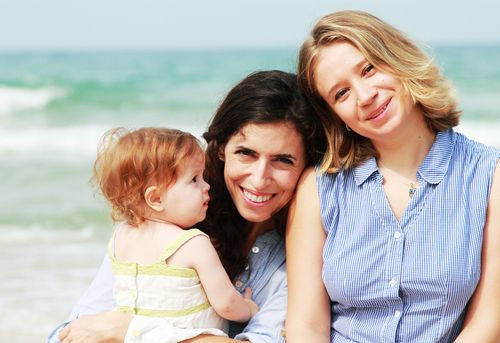Study Finds Same Sex Couples Make Better Parents: Is It Because They're More Prepared?

Many people question how capable same-sex parents are of raising children to live fulfilling and successful lives. And while the words "same-sex" have no relation to what it means to raise a good child, it's the exact reason many gay couples get denied the opportunity. Obviously, many people believe that children need to be surrounded by both a mother and father.
When deciding the time is right to have a child, however, gay couples tend to be more prepared, due to the many channels they must go through compared to their heterosexual counterparts. Whether it's through adoption or a surrogate parent, the choice to have a child is a thought-out process.
According to the Guttmacher Institute, more than 51 percent of pregnancies are unplanned. That’s 3.4 million unintended babies born to women 15 to 44 years old. Three of those 10 women will opt for an abortion. While the rate of teen pregnancies has declined 42 percent in the last 24 years, teens who have children may have a more difficult time raising them. By comparison, gay couples can't have an unplanned pregnancy, which causes them to scramble for resources and make sacrifices. Therefore, their children may live better lives.
While there isn’t much research to confirm or deny any of these claims for heterosexual teen parents, recent research suggests that children with same-sex parents are generally healthier with a stronger family system. In an Australian study, researchers from the University of Melbourne surveyed 315 same-sex parents and 500 children. They found that these children "had higher scores on measures of general behavior, general health, and family cohesion compared to population normative data,” the researchers wrote. Eighty percent of the children studied were raised in homes with lesbian parents, while 18 percent were raised among gay dads. The study authors also found that, “perceived stigma is negatively associated with mental health. Through improved awareness of stigma, these findings play an important role in health policy, improving child health outcomes.”
One explanation for this success could be that household responsibilities were more likely to be evenly distributed. "That's really a measure that looks at how well families get along, and it seems that same-sex-parent families and the children in them are getting along well, and this has positive impacts on child health," said lead researcher Dr. Simon Crouch, according to The Washington Times. This basically means that same-sex couples are less likely to conform to traditional gender roles, which can lead to a happier home.
"Previous research has suggested that parenting roles and work roles, and home roles within same-sex parenting families are more equitably distributed when compared to heterosexual families," Crouch said. "So what this means is that people take on roles that are suited to their skill sets rather than falling into those gender stereotypes, which is mum staying home and looking after the kids and dad going out to earn money. What this leads to is a more harmonious family unit and therefore feeding on to better health and wellbeing."
More than 16,000 same-sex couples are raising over 22,000 adopted children in the U.S., according to the Williams Institute, and the children raised among these parents were no different than those adopted by straight parents.



























